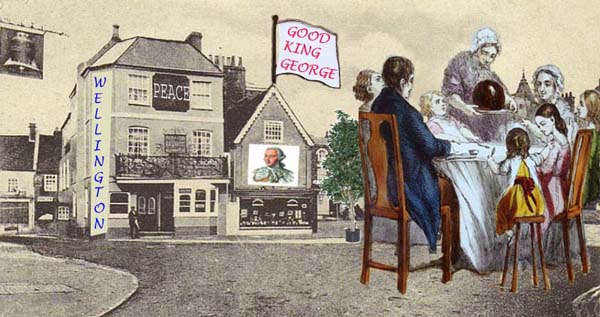
Celebrating the peace in 1814
From Jackson’s Oxford Journal (16 July 1814)
At Winslow, on Wednesday, the 29 ult. at an early hour, the streets were turned into avenues of oaks, in their full verdure. At ten o’clock the following procession commenced: The Master and Mistress of the Sunday School, followed by their Scholars, about seventy in number; a garland of great magnitude, in the form of the word “Peace”, supported apparently by two young Ladies, but carried by three men; Britannia mounted on horseback, with trident and laurel branch attended by her Equerry, followed by twelve young Ladies in white having each a nosegay; next came twelve young Gentlemen, with laurel etc.; the lace pillar, adorned with streamers of lace, surrounded with laurel; a large loaf, carried in the same manner; - the whole interspersed with a variety of white flags, having appropriate mottos on them. The procession went through the streets to the Market-square, where tables were prepared for the reception of the poor. The Ladies having strewed the tables with their flowers, the poor took their seats (about six hundred in number) and grace being said by the Clergymen of the parish, they were plentifully supplied, by the assistance of the respectable inhabitants and their servants, with roast and boiled beef, plum pudding and fine ale.
On the removal of the cloths, the Clergymen repeated the first two lines of “Praise God, from whom all blessings flow,” the band playing the air with due solemnity. The following toast was then drunk with the highest enthusiasm – Our King, Constitution, and Laws – Plenty of fine ale, with pipes, tobacco, and snuff, were then circulated round the tables. Musicians were provided for various groups of dancers. The females retired into the Bowling Green, and partook of tea afforded them by a subscription of the Ladies, who personally presided, and cheerfully gave their attendance. The exertions of the Committee were crowned with complete success, and the whole day passed off with the utmost harmony, decorum and satisfaction.
The following lines are most respectfully dedicated to Mr John Cowley, and the other Gentlemen of the Committee of Winslow, for celebrating the peace:-
Hail, lovely Peace! Again your charms are found, In grand procession now they march along, A brave Old Veteran*, in the martial line, Next Plenty does her smiling board expand, Again in cheerful notes the pleasing band Another rural spot, by Nature form’d , The tea being o’er, pleasure forms a line |
* William Ovitts, who was in General Elliott’s Light Horse, and rescued William, Duke of Cumberland, from three of the French.

Ed Grimsdale's reconstruction of the celebrations.
If the railings of The George really came from Claydon House, as widely believed, they can only just have been installed by 1814.
Ed Grimsdale adds:
England was full of celebrations during the summer of 1814. So hard did it party that it took months to restore the Royal Parks in London to their former condition. The rejoicings were on two fronts: the victory of the Allies over France, followed by the departure of Emperor Napoleon to rule over the tiny island of Elba, and one hundred years of solid, settled, Protestant rule of Great Britain by the three Georges of the House of Hanover. Little did they realise that they would be fighting Napoleon again the next year.
It’s interesting to see that the children of Winslow paraded in their Sunday School groups. Sunday Schools were established in the second half of the 18th century and Buckinghamshire was in the vanguard with Hannah Ball establishing one of the first ones in High Wycombe, and Buckingham was quick to follow. Winslow's Church of England Sunday School was established on 24 August 1788, when Rev. N.A. Owen preached a sermon which was subsequently published.
When the clergy and band intoned “Praise God, from Whom all Blessings flow; Praise Him, all Creatures here below” they were quoting from Bishop Thomas Ken’s paraphrase of the “Old 100th” Psalm. Thomas Ken, a man of great principle, would have appealed to the enthusiastic protestants of Winslow. A story is told that when he was, briefly, Chaplain to King Charles II, the King asked Ken to accept Nell Gwyn (the King’s mistress) into his residence. Ken prickled, “It is not suitable that the Royal Chaplain should double as the Royal Pimp.” His refreshing bluntness, a lone, true voice in a welter of sycophancy was rewarded: Ken was made Bishop of Bath & Wells. Later, when the King was on his deathbed, Ken was summoned from retirement, Charles wanted the truth, the whole truth, and nothing but the truth.
This version of the William Ovitts story is in conflict with other accounts. Did he save the Duke of Cumberland (later nick named “Butcher” Cumberland after brutal events during Battle of Culloden), or did he rescue a German Prince and General? Ovitts was later to live on the proceeds of his tale – did he invent the whole thing?
General Gebhard von Blücher was a Prussian General whose direct charges were an effective instrument that complemented the work done by Wellington and the British Army. Because Britain was under Hanoverian rule, the German’s exploits were feted across our country.
J. Hoare, the writer of the poem, was a member of a well-known Dunton family. It included farmers and later a Vicar of Dunton.
See also:
